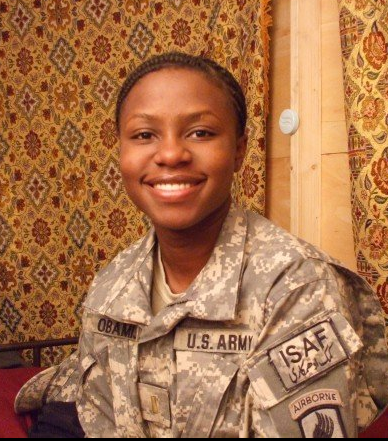Change of Mission: Bringing Military Supply Chain Experience to Civilian Life

Sophia Obamije, MSCM ’19, spent nine years in the military working in logistics and supply chain management. MSCM helped her transition to a civilian corporate setting, where she now works as a Program Manager for Microsoft. How is supply chain work in the army different from the regular world? “In the corporate world,” Sophia says, “you risk the product arriving late to the customer or running out of stock. In the military, what you’re moving is to help people live their lives. Whether it’s food, water, construction material, or bullets—supply chain in the army is life or death.”
Immersion in Army Logistics
Even though she’s not from a military family, Sophia attended the U.S. Military Academy at West Point after high school. “I was already gung-ho on going to the best college possible,” Sophia recalls, “and then I was recruited. I was a bit reluctant, but I liked the idea of ‘be all you can be.’”
After she graduated West Point in 2006, Sophia began working in the army right away. “The army is like a microcosm of the United States: they have their own HR, finance, hospitals, doctors, and engineers. I began working in maintenance, and eventually, I became a logistics officer, which means dealing with transportation and supply chains in the army.”
Seeking New Challenges
Sophia spent nearly a decade in the military and was deployed twice to Afghanistan and Iraq. She enjoyed her time in the army, but eventually, she craved a different type of challenge. Seeking to engage a different skillset and broaden her horizons, Sophia left the military for a position with Johnson & Johnson.
This felt like a whole other world to Sophia after 13 years in a military setting. She quickly decided she needed something to jumpstart this new chapter of her career. “I felt like I wasn’t competitive with my civilian peers, and I wanted to level the playing field,” Sophia says.
“I didn’t want to be caught off guard or feel like I’m coming from behind. When it comes to information and knowledge, I have FOMO.”
Post-Military Professional Support
After Sophia moved to Washington for a role with Keurig, she was drawn to Foster’s MSCM program. It would directly support her work standing up Keurig’s supply chain, and she could complete her coursework while she worked full-time.
Her MSCM classes immediately helped her on the job: “I was able to apply what I learned in my forecasting and project management courses right away. I thought, ‘we don’t have this agile methodology—this is what I can bring to the company.’” The Foster MSCM program gave Sophia the confidence she was looking for and helped fill in the gaps in her military supply chain background.
As Sophia now brings her talents to Microsoft as a Program Manager, she continually finds more ways to apply lessons learned at Foster: “The processes that I learned in MSCM can be applied universally—in finance, marketing, IT—not just supply chain management. You get a sense of operations in general, operations that exist everywhere.”
Member of the armed forces? You may be eligible to use your military education benefits. For more information on financing your MSCM degree with military benefits, connect with the Veterans Education Benefits Office (VEBO).
Learn more about the Foster MSCM experience by attending an upcoming online information session or online MSCM alumni panel.
Written by Joe Garvin
Writer & Content Strategist
[email protected]
